The adoption of the Universal Declaration of Human
Rights (UDHR) on the eve of 10 December 1948 in New York by the then
member-states of the United Nations gave new hope to the world. An
embodiment of the civil, political, socio-economic and cultural rights of
every member of the global human family, the UDHR was a welcome
declaration expected to guide UN member-states in their conduct of
governing their countries to usher in societies where justice, peace and
prosperity for all would prevail.
Eleanor Roosevelt, the then Chair of the UN Commission which drafted the
document cited: “Where after all do human rights begin? In small
places, close to home – so close and so small that they cannot be seen on
any maps of the world. Yet they are the world of the individual person;
the neighborhood he lives in; the school or college he attends; the
factory, farm or office where he works. Such are the places where every
man, woman, and child seeks equal justice, equal opportunity, equal
dignity without discrimination. Unless these rights have meaning there,
they have little meaning anywhere. Without concerned citizen action to
uphold them close to home, we shall look in vain for progress in the
larger world.”
1
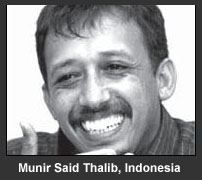 The UDHR
celebrates its 60th anniversary this 2008. Sixty years is a long
time and this urges us to revisit some Asian countries particularly in
relation to the issue of enforced disappearance. These countries were
focused on in the book titled: Reclaiming Stolen Lives published
and launched by AFAD on the eve of the International Day of the
Disappeared (IDD) on 29 August of this year namely, China, India
(particularly Jammu & Kashmir), Indonesia, Nepal, Pakistan, Philippines,
Sri Lanka and Thailand. (Note: These countries will henceforth be referred
to as “the countries.”)
The UDHR
celebrates its 60th anniversary this 2008. Sixty years is a long
time and this urges us to revisit some Asian countries particularly in
relation to the issue of enforced disappearance. These countries were
focused on in the book titled: Reclaiming Stolen Lives published
and launched by AFAD on the eve of the International Day of the
Disappeared (IDD) on 29 August of this year namely, China, India
(particularly Jammu & Kashmir), Indonesia, Nepal, Pakistan, Philippines,
Sri Lanka and Thailand. (Note: These countries will henceforth be referred
to as “the countries.”)
Likewise, the UN adopted the Declaration on Human Rights Defenders on 9
December 1998 so that this year is also the 10th anniversary of yet
another historic document. The Declaration is intended to protect those
who are directly involved in human rights work so that they can freely
perform their tasks. Paradoxically though, many victims of human rights
violations including disappearances over the years are human rights
defenders, themselves. They were and are at the
forefront of repression and harassment by their own governments as they
perform their tasks.
A Flashback to 1948
When the UDHR was adopted in 1948, the world was reeling from the
cruelties of World War II particularly the loss of millions of lives and
destruction of property. Parents lost their children, wives lost their
husbands and children were orphaned. As a whole, the world was wounded and
in pain and moving on took such a great effort. Such a global reality
prompted the then young UN to
adopt the UDHR.
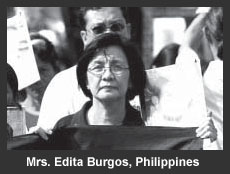 A brief
glance at some Asian countries when the UDHR was adopted… In China,
the civil war between the Communist Party of China (CPC) and the
Kuomintang was about to end. With the war having ended in 1949, the
country came to be called People’s Republic of China (PRC) and was run by
the CPC under a single party system. In Jammu & Kashmir, the state
became a part of India in 1947, and in 1948, the Indian forces arrived
prompting the first war between Pakistan and India over the disputed
territory. Indonesia was struggling to be freed from its Dutch
colonizers after Japan (which occupied the country in 1942) surrendered in
1945. The country gained independence in 1949. Nepal devised its
own constitution called “the Government of Nepal Act 1948” under the Hindu
monarchy. Pakistan was engaged in war with India over the disputed
territory of Jammu & Kashmir. The Philippines was struggling over
the effects of World War II where millions of Filipinos were killed and
Manila was left in shambles. While the country was supposed to have gained
“independence” in 1946, the then present government continued to be
dictated upon and controlled by the US politically and economically.
Sri Lanka gained its independence from its British colonizers in
the same year of 1948 and was consequently ruled by a Prime Minister who
remained under British tutelage. Thailand was never colonized but
was also involved in World War II.
A brief
glance at some Asian countries when the UDHR was adopted… In China,
the civil war between the Communist Party of China (CPC) and the
Kuomintang was about to end. With the war having ended in 1949, the
country came to be called People’s Republic of China (PRC) and was run by
the CPC under a single party system. In Jammu & Kashmir, the state
became a part of India in 1947, and in 1948, the Indian forces arrived
prompting the first war between Pakistan and India over the disputed
territory. Indonesia was struggling to be freed from its Dutch
colonizers after Japan (which occupied the country in 1942) surrendered in
1945. The country gained independence in 1949. Nepal devised its
own constitution called “the Government of Nepal Act 1948” under the Hindu
monarchy. Pakistan was engaged in war with India over the disputed
territory of Jammu & Kashmir. The Philippines was struggling over
the effects of World War II where millions of Filipinos were killed and
Manila was left in shambles. While the country was supposed to have gained
“independence” in 1946, the then present government continued to be
dictated upon and controlled by the US politically and economically.
Sri Lanka gained its independence from its British colonizers in
the same year of 1948 and was consequently ruled by a Prime Minister who
remained under British tutelage. Thailand was never colonized but
was also involved in World War II.
In terms of the countries’ membership in the UN
2,
China, India and the Philippines became members in 1945 while Pakistan and
Thailand became members in 1946 and 1947 respectively so that the five
countries were with the body that adopted the UDHR. Indonesia, Nepal and
Sri Lanka became UN members later in the 1950s so that they too are
parties to the UDHR for many decades.
Enforced Disappearances in Asia and the Plight of Human Rights Defenders
Some common trends are manifested in the above mentioned countries. Over
the past six decades, those who suffered most were the masses of poor
people while the few elite ruled and amassed for themselves, their
families and cohorts, the wealth of the earth. From the ranks of the poor
and also from other sectors rose heroic individuals who fought for the
interests of society and became known as human rights defenders. They
fought for justice along with their people often at the cost of their
lives.
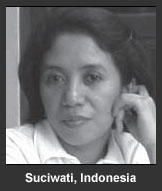 In terms of
the phenomenon of enforced disappearance, the book, Reclaiming Stolen
Lives, has established that the situation of Asia today is similar to
that of Latin America some three decades ago. The common trend in the
countries is exemplified in the fact that when the poor and oppressed
peoples fought for their basic rights, their governments fought back with
full force and violated their rights including that of disappearing them.
Reclaiming Stolen Lives presents a total of 5,326 recorded cases of
enforced disappearance in the countries but this figure is miniscule
compared to those cited by AFAD’s member-organizations. Accordingly, it is
very difficult to present a complete documentation of cases. Some families
are continuously threatened so that they are forced to remain silent while
others have gone back and forth to the police to report their disappeared
loved ones but are largely ignored.
In terms of
the phenomenon of enforced disappearance, the book, Reclaiming Stolen
Lives, has established that the situation of Asia today is similar to
that of Latin America some three decades ago. The common trend in the
countries is exemplified in the fact that when the poor and oppressed
peoples fought for their basic rights, their governments fought back with
full force and violated their rights including that of disappearing them.
Reclaiming Stolen Lives presents a total of 5,326 recorded cases of
enforced disappearance in the countries but this figure is miniscule
compared to those cited by AFAD’s member-organizations. Accordingly, it is
very difficult to present a complete documentation of cases. Some families
are continuously threatened so that they are forced to remain silent while
others have gone back and forth to the police to report their disappeared
loved ones but are largely ignored.
However, most families search for their loved ones for years without
let-up even amidst repression and threats to their lives. Many formed
organizations and actively participate in the justice campaign nationally,
regionally and internationally. Developing a strong, united voice, they
confront their governments in various ways asking for the whereabouts of
the disappeared. In the process, they developed to become human rights
defenders themselves and earn the ire of their governments. To date, human
rights defenders within the AFAD network have been and continue to be
persecuted. To mention some: AFAD’s then chairperson, Munir was poisoned
by a lethal dose of arsenic on 7 September 2004, on a Garuda flight from
Jakarta to Amsterdam via Singapore. Munir, a lawyer by profession,
bravely defended many cases of human rights violations particularly
enforced disappearances, was very vocal against the unjust and
undemocratic policies of the government and had co-founded several human
rights organizations in Indonesia including Imparsial, KontraS
and IKOHI. His death was a major blow to the Federation which was actively
participating in the negotiation process of the then UN Inter-Sessional
Working Group to Elaborate a Draft Legally-Binding Normative Instrument
for the Protection of All Persons from Enforced or Involuntary
Disappearances. Munir, together with AFAD’s Secretary-General, were
supposed to participate in the September 2004 session of the then drafting
body for the international treaty against enforced disappearances.
Suciwati, the widow of Munir is unrelenting in her efforts to find
truth and justice for her husband’s murder. As a consequence, she is not
spared from threats by the alleged perpetrators. Weeks after her husband’s
murder, Suciwati received a package with a dead chicken and a letter from
the alleged protectors of the New Order Regime stating that if she
continued to blame the intelligence authorities for the murder of her
husband, her fate would be likened to that of the dead chicken. Never
deterred by threats to her life, Suciwati continues to work for justice
for her husband whose case is still pending in court four years after his
death.
In May 2005, during the 75th session of the UN Working Group on Enforced
or Involuntary Disappearances (UNWGEID), the AFAD Council received a
letter from KontraS, its member-organization in Indonesia. The
letter cited threats to the life of incumbent AFAD Chairperson
Mugiyanto, KontraS Coordinator Usman Hamid and two
others within the network. An attached letter from alleged members of the
defenders of the New Order stated that these four persons were enemies of
the state and if they continued working on the case of Munir, they would
be killed within fourteen days. The threat was brought to the attention of
the UNWGEID which immediately wrote a letter of concern to the Indonesian
government. In 2002, 2003 and 2004, the KontraS office was
raided by armed men who destroyed office facilities. KontraS filed
a case in the first raid but only seven persons were brought to court and
imprisoned for three months. For the second raid, they were looking for
Munir who was not there. The raiders said that KontraS was
anti-Indonesia. The two raids were reported to the police but no progress
was ever achieved.
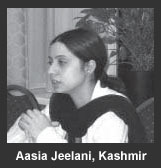 Aasia
Jeelani, former editor of Voices Unheard, a women’s publication in
Srinagar, Kashmir and a volunteer of AFAD’s memberorganization, the
Association of Parents of Disappeared Persons (APDP), was killed by a
landmine on 20 April 2004 while on an election monitoring exercise. Her
driver was also killed while two of her colleagues were wounded. One of
them, Khurram Parvez, an active member of the AFAD Council, who was with
her during the monitoring exercise, had his leg amputated. Khurram
Parvez is one of the 2004 recipients of the Reebok Human Rights Award.
Atty. Parvez Imroz, the patron of APDP, and a recipient of the
Ludovic-Trarieux International Human Rights Prize in 2006, has
undergone three assassination attempts the last of which was on 30 June
2008. At around 8:00 PM on that day, nine or ten armed men arrived at his
house in Kralpura village (some 8 kilometers from Srinagar) and demanded
that Atty. Imroz come outside. Imroz told his wife not to open the door
and instead, called his brother, Sheik Mustaq Ahmad, who lives nearby. Mr.
Ahmad came out and asked the group to identify themselves which they
refused. When his nephew went out, one of the uniformed men fired in his
direction but he was hit. Another man threw a grenade outside his front
door. This exploded but fortunately no one was hurt. The men left around
10:30 P.M. Villagers who gathered near Imroz’s house stated that they saw
an armoured vehicle, two Gypsy cars and men in CRPF (Central Reserve
Police Force) and SOG (Special Operations Group) uniforms. At the time
this occurred, Atty. Imroz and his fellow human rights defenders had
recently formed a “People’s Tribunal” which among others, would look into
the reported graves and mass graves estimated to be close to a thousand
victims and probably the graves of disappeared Kashmiris.
Aasia
Jeelani, former editor of Voices Unheard, a women’s publication in
Srinagar, Kashmir and a volunteer of AFAD’s memberorganization, the
Association of Parents of Disappeared Persons (APDP), was killed by a
landmine on 20 April 2004 while on an election monitoring exercise. Her
driver was also killed while two of her colleagues were wounded. One of
them, Khurram Parvez, an active member of the AFAD Council, who was with
her during the monitoring exercise, had his leg amputated. Khurram
Parvez is one of the 2004 recipients of the Reebok Human Rights Award.
Atty. Parvez Imroz, the patron of APDP, and a recipient of the
Ludovic-Trarieux International Human Rights Prize in 2006, has
undergone three assassination attempts the last of which was on 30 June
2008. At around 8:00 PM on that day, nine or ten armed men arrived at his
house in Kralpura village (some 8 kilometers from Srinagar) and demanded
that Atty. Imroz come outside. Imroz told his wife not to open the door
and instead, called his brother, Sheik Mustaq Ahmad, who lives nearby. Mr.
Ahmad came out and asked the group to identify themselves which they
refused. When his nephew went out, one of the uniformed men fired in his
direction but he was hit. Another man threw a grenade outside his front
door. This exploded but fortunately no one was hurt. The men left around
10:30 P.M. Villagers who gathered near Imroz’s house stated that they saw
an armoured vehicle, two Gypsy cars and men in CRPF (Central Reserve
Police Force) and SOG (Special Operations Group) uniforms. At the time
this occurred, Atty. Imroz and his fellow human rights defenders had
recently formed a “People’s Tribunal” which among others, would look into
the reported graves and mass graves estimated to be close to a thousand
victims and probably the graves of disappeared Kashmiris.
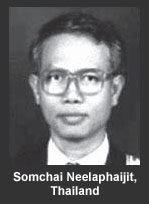 Somchai
Neelaphaijit, former Chairman of the Thailand’s Muslim Lawyers’
Association and former Vice-Chairman of the Human Rights Committee of the
Lawyers’ Council in Thailand, disappeared while he was representing five
persons arrested because of the militant raid on the Narathiwat
Rajanakarin Camp on 4 January 2004. He was last seen at the Chaleena Hotel
on Ramkhamhaeng Road in Bangkok on 12 March 2004. His car was found
abandoned in Kamphaeng Phet Road near Mor Chit bus terminal. Prior to his
disappearance, he was threatened for taking on the cases of two Thai
alleged members of the Jemaah Islamiyah, a Southeast Asia based Islamic
group accused of carrying out bomb attacks in Thailand. The Asian Human
Rights Commission (AHRC) based in Hongkong, gave a Human Rights Defenders’
Award to Somchai in 2006. Somchai’s wife, Angkhana Neelaphaijit,
has been persistent in her efforts to obtain justice, unsparing in her
criticism of government authorities, and has taken the lead role as an
articulate and courageous spokesperson for the families of disappeared
persons in Southern Thailand. In giving the award to Somchai, the AHRC
also applauded the tremendous contribution that Angkhana has made in
confronting the impunity enjoyed by state officers in Thailand. Angkhana,
who has brought to national and international authorities the case of her
husband, is not spared from threats to her person. She chairs the Working
Group on Justice for Peace (WGJP), AFAD’s most recent member-organization.
Somchai
Neelaphaijit, former Chairman of the Thailand’s Muslim Lawyers’
Association and former Vice-Chairman of the Human Rights Committee of the
Lawyers’ Council in Thailand, disappeared while he was representing five
persons arrested because of the militant raid on the Narathiwat
Rajanakarin Camp on 4 January 2004. He was last seen at the Chaleena Hotel
on Ramkhamhaeng Road in Bangkok on 12 March 2004. His car was found
abandoned in Kamphaeng Phet Road near Mor Chit bus terminal. Prior to his
disappearance, he was threatened for taking on the cases of two Thai
alleged members of the Jemaah Islamiyah, a Southeast Asia based Islamic
group accused of carrying out bomb attacks in Thailand. The Asian Human
Rights Commission (AHRC) based in Hongkong, gave a Human Rights Defenders’
Award to Somchai in 2006. Somchai’s wife, Angkhana Neelaphaijit,
has been persistent in her efforts to obtain justice, unsparing in her
criticism of government authorities, and has taken the lead role as an
articulate and courageous spokesperson for the families of disappeared
persons in Southern Thailand. In giving the award to Somchai, the AHRC
also applauded the tremendous contribution that Angkhana has made in
confronting the impunity enjoyed by state officers in Thailand. Angkhana,
who has brought to national and international authorities the case of her
husband, is not spared from threats to her person. She chairs the Working
Group on Justice for Peace (WGJP), AFAD’s most recent member-organization.
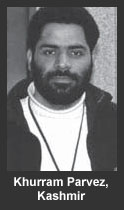 Human
rights violations continue in China. The Tibetan Centre for Human
Rights and Democracy (TCHRD) appealed through the World Organisation
Against Torture (OMCT) and the International Federation for Human Rights (FIDH)
about the enforced disappearance of five monks from Ramoche Temple namely
39-year-old Mr. Sonam Rabgyal, Damdul, Rabgyal, and two
other monks who were arrested during a midnight raid on the monks’
residence on 7 April 2008. On that night, around 70 monks of Ramoche
Temple, which is located to the north of Lhasa city, were detained after
the Public Security Bureau (PSB) and People’s Armed Police (PAP) forces
carried out a midnight raid on the monks’ residence. While most of them
were released a few days later after having been interrogated, the
whereabouts of Mr. Sonam Rabgyal, Damdul, Rabgyal and two other monks
remain unclear. Aside from the five cases of disappearance, the TCHRD in
its press release of 25 September 2008, cited that after the outbreak of
the major protests across the Tibetan plateau since 10 March 2008,
cases of enforced disappearance of Tibetans surfaced. TCHRD cited “there
are at least more than a thousand Tibetans whose current whereabouts and
well-being remains completely unknown to their family members and their
affiliated monasteries.”
3
Human
rights violations continue in China. The Tibetan Centre for Human
Rights and Democracy (TCHRD) appealed through the World Organisation
Against Torture (OMCT) and the International Federation for Human Rights (FIDH)
about the enforced disappearance of five monks from Ramoche Temple namely
39-year-old Mr. Sonam Rabgyal, Damdul, Rabgyal, and two
other monks who were arrested during a midnight raid on the monks’
residence on 7 April 2008. On that night, around 70 monks of Ramoche
Temple, which is located to the north of Lhasa city, were detained after
the Public Security Bureau (PSB) and People’s Armed Police (PAP) forces
carried out a midnight raid on the monks’ residence. While most of them
were released a few days later after having been interrogated, the
whereabouts of Mr. Sonam Rabgyal, Damdul, Rabgyal and two other monks
remain unclear. Aside from the five cases of disappearance, the TCHRD in
its press release of 25 September 2008, cited that after the outbreak of
the major protests across the Tibetan plateau since 10 March 2008,
cases of enforced disappearance of Tibetans surfaced. TCHRD cited “there
are at least more than a thousand Tibetans whose current whereabouts and
well-being remains completely unknown to their family members and their
affiliated monasteries.”
3
In Sri Lanka, human rights defenders continue to
be harassed. In another urgent appeal dated 30 September 2008, the
Observatory for the Protection of Human Rights Defenders, a joint
programme of the World Organisation Against Torture (OMCT) and the
International Federation for Human Rights (FIDH), requested urgent
intervention. The Observatory cited a grenade attack on the
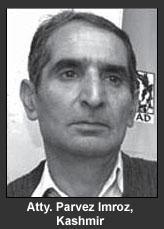 residence
of Mr. J.C. Weliamuna, a human rights lawyer and Executive Director
of the Sri Lanka chapter of Transparency International. Accordingly on 27
September 2008, at 11.40 PM, an unidentified gang lobbed two hand grenades
at the residence of Mr. J.C Weliamuna. Property was damaged but
fortunately no bodily harm was caused to Mr. Weliamuna or members of his
family. According to the Observatory, Mr. Weliamuna has appeared in highly
sensitive cases involving corruption and human rights violations,
including pending cases involving government officials and members of the
police force. On the day of the attack, Mr. Weliamuna supported a motion
at the Bar Council regarding another lawyer who had received death threats
due to his appearance in an extrajudicial killing case. The victim had
previously brought two complaints against police officers, for bribery and
torture. The Bar Council unanimously decided to act on the complaint,
condemned interference with the work of lawyers and resolved to pursue the
matter with the Inspector General of Police and other competent
authorities.
residence
of Mr. J.C. Weliamuna, a human rights lawyer and Executive Director
of the Sri Lanka chapter of Transparency International. Accordingly on 27
September 2008, at 11.40 PM, an unidentified gang lobbed two hand grenades
at the residence of Mr. J.C Weliamuna. Property was damaged but
fortunately no bodily harm was caused to Mr. Weliamuna or members of his
family. According to the Observatory, Mr. Weliamuna has appeared in highly
sensitive cases involving corruption and human rights violations,
including pending cases involving government officials and members of the
police force. On the day of the attack, Mr. Weliamuna supported a motion
at the Bar Council regarding another lawyer who had received death threats
due to his appearance in an extrajudicial killing case. The victim had
previously brought two complaints against police officers, for bribery and
torture. The Bar Council unanimously decided to act on the complaint,
condemned interference with the work of lawyers and resolved to pursue the
matter with the Inspector General of Police and other competent
authorities.
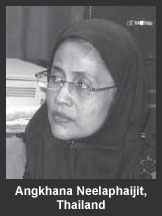 In
the Philippines, a new case of enforced disappearance of a human
rights defender was reported. Based on the report, Mr. James Balao
disappeared on 17 September 2008 on his way to visit his family in La
Trinidad, Benguet. He had earlier sent a text message (SMS) to his family
that he was on his way home coming from Baguio. He never reached home.
Belonging to the Ibaloi and Kankanaey tribes, Mr. Balao is a member of the
Cordillera People’s Alliance (CPA) and the president of the Oclupan Clan
Association, an organization that works for self-determination of the
indigenous peoples of the Cordillera. Prior to his disappearance, Mr.
Balao had informed his immediate family that he noticed an unknown group
of men routinely watching and following him. After his disappearance, Mr.
Balao’s family has been continuously searching for him in all places
possible including various military detachments in Northern Philippines –
in La Trinidad, Benguet, Lagangilang, Abra and San Fernando, La Union. To
this writing though, nothing is known of the whereabouts of Mr. Balao.
In
the Philippines, a new case of enforced disappearance of a human
rights defender was reported. Based on the report, Mr. James Balao
disappeared on 17 September 2008 on his way to visit his family in La
Trinidad, Benguet. He had earlier sent a text message (SMS) to his family
that he was on his way home coming from Baguio. He never reached home.
Belonging to the Ibaloi and Kankanaey tribes, Mr. Balao is a member of the
Cordillera People’s Alliance (CPA) and the president of the Oclupan Clan
Association, an organization that works for self-determination of the
indigenous peoples of the Cordillera. Prior to his disappearance, Mr.
Balao had informed his immediate family that he noticed an unknown group
of men routinely watching and following him. After his disappearance, Mr.
Balao’s family has been continuously searching for him in all places
possible including various military detachments in Northern Philippines –
in La Trinidad, Benguet, Lagangilang, Abra and San Fernando, La Union. To
this writing though, nothing is known of the whereabouts of Mr. Balao.
In Pakistan, some sectors hope that with the new
government headed by the Pakistan People’s Party (PPP) led by President
Asif Ali Zardari, enforced disappearance and other human rights violations
would be resolved and the rule of law would finally prevail in the
country. Zardari took the
lead in the PPP after his wife former Prime Minister Benazir Bhutto was
slain in December 2007. He was elected to the presidency in September 2008
not by public vote but by lawmakers in the two houses of the National
Assembly and in the four provincial assemblies in the country.
The Human Rights Commission of Pakistan (HCRP) cited in
its 2007 report that at least 600 people disappeared in Balochistan in
2007. In the same report, it also stated that the “missing in Balochistan
could run into the thousands, according to some political organizations in
the province.” Before Musharraf deposed the Chief Justice, the Supreme
Court had been hearing cases of disappearances leading to the tracing of
56 victims, 45 of whom surfaced in April 2007.
4 Meanwhile, the
Asian Human Rights Commission (AHRC) cited in its statement dated March 3,
2008 that the Lawyers’ Movement in Pakistan which started in March 2007 is
at the “vanguard of
democracy” in the country.
5 The movement was ignited by then
General Musharraf’s move to illegally and unconstitutionally depose Chief
Justice Iftekhar Choudhry. Thousands of lawyers from all over the country
along with civil society and human rights organizations, ordinary folk,
media and other sectors consistently fought for the ousting of Musharraf,
the reinstatement of the Chief Justice, the return of the rule of law, the
supremacy of the judiciary and the restoration of the constitution. The
people’s rallies, marches, and other mass movements in 2007 until the
first half of 2008 composed of thousands of people led to the resignation
of Musharraf on 18 August 2008.
Earlier, Amnesty International (AI) delivered a report
titled: Denying the Undeniable: Enforced Disappearances in Pakistan
6
in July 2008. AI cited that its report makes use of “Official Supreme
Court transcripts, together with affidavits from people released following
periods of enforced disappearance and communications from lawyers
representing persons subjected to enforced disappearance.” The report
provides details on cases of enforced disappearances and the justice
campaign espoused by the families of victims. In September of this year,
AI supported Ms. Amina Masood Janjua, the wife of a disappeared in
Pakistan and leader of an advocacy group called “Defense of Human Rights,”
in her travel tour to some European countries including the US to speak on
enforced disappearance and gather international support. She made her trip
to Europe but her visa to Washington, DC was revoked by the US embassy in
Islamabad
In Nepal, the Human Rights Watch (HRW) and
Advocacy Forum (AF) came out with a report on 11 September 2008 titled:
“Waiting for Justice: Unpunished Crimes from Nepal’s Armed Conflict.”
In said report, the two organizations call on the new Maoistled government
of Nepal “to investigate and prosecute those responsible for thousands of
extrajudicial killings, torture, and enforced disappearances during the
country’s decade-long armed conflict.”
7 The report documents in detail
62 cases of killings, disappearances, and torture between 2002 and 2006
perpetrated by the security forces but including a couple of cases
involving Maoists. The families of victims have earlier filed complaints
with the police seeking investigations but these complaints were not
responded to. (Note: For more details on Nepal’s development, please,
refer to separate articles in this issue.)
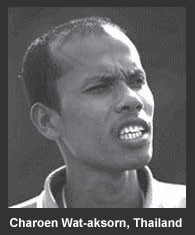 In
sum, as we commemorate the 60th anniversary of the UDHR and the 10th
anniversary of the Declaration on Human Rights Defenders this year, 2008,
the implementation of human rights – “…in small places, close to home –
so close and so small that they cannot be seen on any maps of the world
…” cited by Eleanor Roosevelt in 1948 has still a long way to go.
Certainly, the updates cited above are but a small part of what is
actually happening in the above countries. It is, indeed, very sad that
enforced disappearances and other forms of human rights violations, some
of which were committed from decades back remain unresolved to this day in
the very countries which
In
sum, as we commemorate the 60th anniversary of the UDHR and the 10th
anniversary of the Declaration on Human Rights Defenders this year, 2008,
the implementation of human rights – “…in small places, close to home –
so close and so small that they cannot be seen on any maps of the world
…” cited by Eleanor Roosevelt in 1948 has still a long way to go.
Certainly, the updates cited above are but a small part of what is
actually happening in the above countries. It is, indeed, very sad that
enforced disappearances and other forms of human rights violations, some
of which were committed from decades back remain unresolved to this day in
the very countries which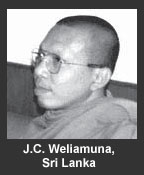 are parties to the UDHR, the Declaration on Human Rights Defenders and
many other universal treaties. As the situation persists, the wounds and
pains suffered by families and relatives of victims remain and societies
continue to be unhealed. A big achievement though is that people
from all nooks and corners of the region and in the world along with their
advocacy groups and human rights organizations continue to struggle for
justice and for the implementation of human rights in their own countries
amidst repression and threats to their lives. Certainly, the achievements
in each country are achievements for the continent and the whole global
society.
are parties to the UDHR, the Declaration on Human Rights Defenders and
many other universal treaties. As the situation persists, the wounds and
pains suffered by families and relatives of victims remain and societies
continue to be unhealed. A big achievement though is that people
from all nooks and corners of the region and in the world along with their
advocacy groups and human rights organizations continue to struggle for
justice and for the implementation of human rights in their own countries
amidst repression and threats to their lives. Certainly, the achievements
in each country are achievements for the continent and the whole global
society.